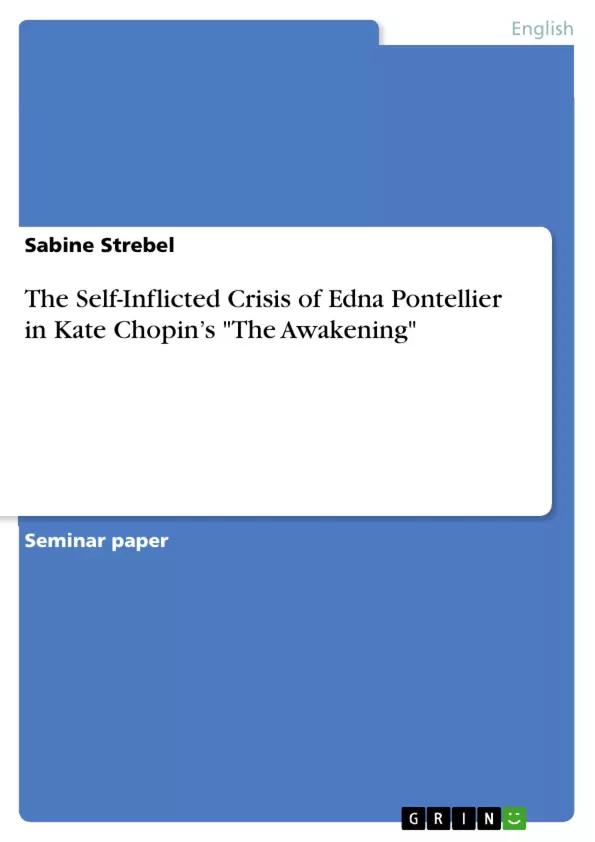In 21st-century America, women fulfil many different roles in their lives: they are daughters and sisters, they are colleagues and friends. Women can be wives and mothers. They can choose freely whether they want to go to university which offers them a wide range of subjects. They can become doctors, lawyers, teachers, scientists, writers, artists, engineers or the next president of the United States of America. Women can determine their future and are free to change the paths they take. To refer to a common idiom: every woman is the architect of her own fortune. For Edna Pontellier, the protagonist of Kate Chopin’s short novel “The Awakening”, which was published in 1899, there are only two roles in her life: the role of wife and mother. She gets lost between the social structures of patriarchy and her willingness to develop her own social identity. Although it seems at first that Edna’s conflict with her expected roles of being a wife and a mother has blocked her way to emancipation, I will argue that it is in fact Edna’s own lack of capabilities and responsibility that provokes her downfall.
Inhaltsverzeichnis (Table of Contents)
- Introduction
- Women Images in the Late 19th Century
- Women in "The Awakening"
- Adèle Ratignolle as the “Southern Lady”
- Edna Pontellier as the “New Woman”
- Conclusion
- Works Cited
Zielsetzung und Themenschwerpunkte (Objectives and Key Themes)
This essay explores the societal constraints placed upon women in late 19th-century America, using Kate Chopin's novel "The Awakening" as a case study. It focuses on the protagonist, Edna Pontellier, and her struggle against the expectations of her time. The essay aims to analyze the conflicting forces of societal norms and individual desire, as embodied by Edna's yearning for self-determination.
- The portrayal of women's roles in late 19th-century America
- The concept of the "Southern Lady" and the "New Woman"
- Edna Pontellier's struggle for self-discovery and independence
- The tension between societal expectations and individual desires
- The consequences of defying societal norms for women in this era
Zusammenfassung der Kapitel (Chapter Summaries)
The introduction delves into the contrasting realities of women's lives in 21st-century America and the limited societal roles expected of women in late 19th-century America. It introduces Edna Pontellier, the protagonist of "The Awakening," and her internal conflict between societal expectations and personal desires.
The second chapter explores the literary context of "The Awakening," discussing its categorization within the genres of realism and naturalism. It examines the prevailing images of women during the late 19th century, highlighting the contrasting figures of the "Southern Lady" and the "New Woman."
The third chapter delves into the portrayal of women within "The Awakening," specifically focusing on the characters of Adèle Ratignolle and Edna Pontellier. It presents Adèle as the embodiment of the "Southern Lady," contrasting her with Edna's struggle for individual liberation.
Frequently Asked Questions
What is the central conflict of Edna Pontellier in "The Awakening"?
Edna struggles between the patriarchal social structures of the late 19th century and her desire for a personal social identity beyond being a wife and mother.
What is the difference between the "Southern Lady" and the "New Woman"?
The "Southern Lady" (like Adèle Ratignolle) embodies traditional domestic roles, while the "New Woman" represents the emerging ideal of female independence and self-determination.
Does the essay blame society for Edna's downfall?
While acknowledging societal constraints, the author argues that Edna's own lack of capability and responsibility also contributes to her crisis.
When was Kate Chopin’s "The Awakening" published?
The novel was published in 1899, reflecting the gender dynamics of the late Victorian era in America.
What literary genres are associated with "The Awakening"?
The work is discussed within the contexts of literary realism and naturalism.
- Arbeit zitieren
- Sabine Strebel (Autor:in), 2017, The Self-Inflicted Crisis of Edna Pontellier in Kate Chopin’s "The Awakening", München, GRIN Verlag, https://www.grin.com/document/412536



